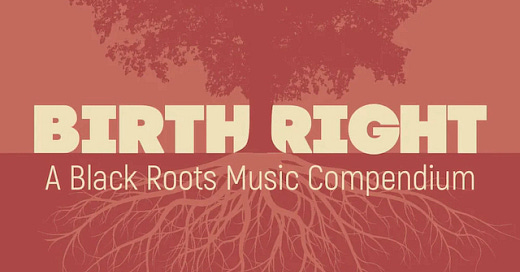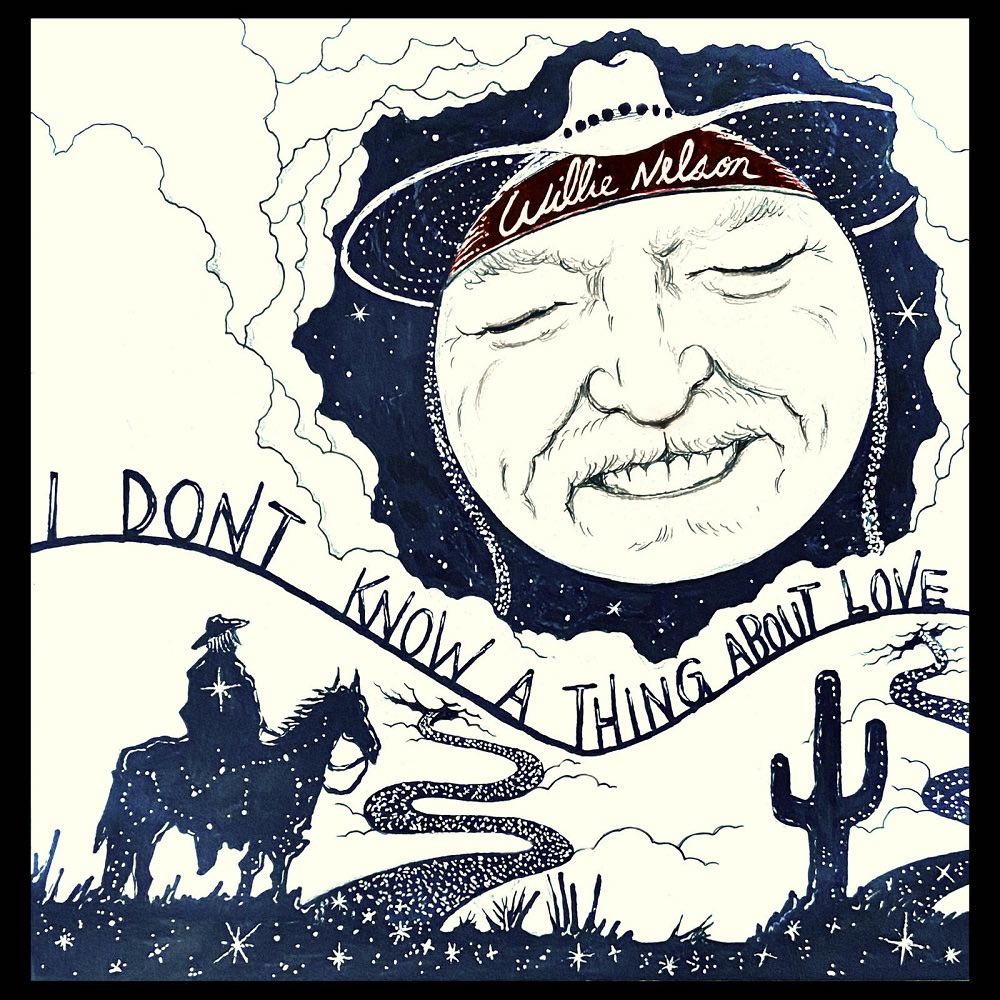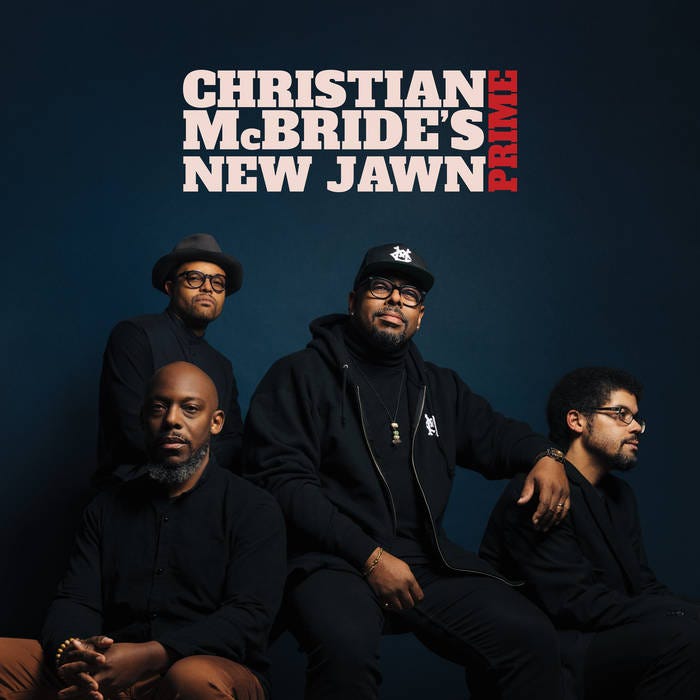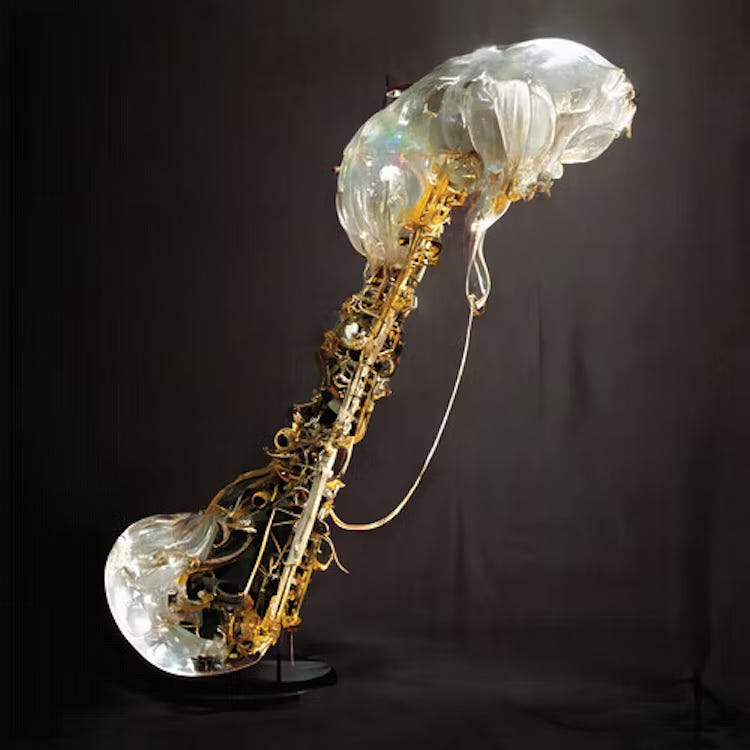Adventures in Listening, March 9, 2023: Out of the Past
A substantial new collection demonstrates the breadth and depth of Black roots music. Plus: Willie Nelson, Christian McBride, and Sam Gendel.
Birthright: A Black Roots Music Compendium
One of my favorite things about Questlove’s Summer of Soul documentary is how it both celebrates Black joy and laments its erasure. By inviting us to bask in the beauty and passion of the 1969 Harlem Cultural Festival, aka Black Woodstock, the movie also asks us to consider why an event of such artistic import and emotional heft has been all but stricken from our shared memory.
One way to receive Birthright: A Black Roots Music Compendium, a new 40-song anthology that spans eras, genres, and geographies, is as a talisman against forgetting. The collection is baptism by immersion in the slipstream of Black folk traditions. Its intellectual argument is that these traditions are the DNA building blocks of American music itself, the raw materials from which rock and hip-hop, country and modern jazz have been forged. Mercifully, the music never bears the stuffiness of academia, nor is it presented in a way that feels didactic or museum-ready. Instead, Birthright simply invites us to wonder in some of the most jubilant, inventive, expressive sounds ever recorded. Its wager is that, by experiencing these wide-ranging songs in a revelatory, curated context, it will become all but impossible to forget the centrality of Black music lineages to whatever we think of as the American monoculture. It’s a wager that pays off handsomely.
Another way to receive this collection is simply as a treasure trove of indispensable music, endlessly moving and richly entertaining. As with so many compilations, there are a number of paradigms that can help you take stock of what you’re hearing. One way into the music is through geography. The set’s compilers, Scott Billington and Ted Olson, represent the traditions of New Orleans and Appalachia, two fixed coordinates that help situate this music between a couple of major geographic poles, yet there is also room here for regional vernaculars: Check out the high-octane, call-and-response jam “Ranky Tanky,” by a band of the same name, born out of low-country South Carolina’s Gullah tradition.
You can also contextualize this music in terms of chronology. The music extends back as far as the 50s but also includes contemporary artists like Carolina Chocolate Drops and Amythyst Kiah, and through brilliant non-chronological sequencing, the disparate eras all merge into one; much of the older material is still so fresh it sounds like it could have been cut today, while the more modern recordings sound like they could be relics of a bygone era. Old and new recordings alike are distinguished by stylish and skillful musicianship. Certainly, there’s no one who blows a harmonica like Sonny Terry does on “Blues Before Sunrise,” while Dom Flemons’ “Polly Put the Kettle On” is irresistible in its string-band swing.
And of course, you can try to situate these songs within broader conversations about genre: Tunes by the Dirty Brass Band and Preservation Hall Jazz Band represent jazz traditions, while choice cuts from Mississippi Fred McDowell, Lightnin’ Hopkins, and Skip James demonstrate the best of the Delta blues lineage. Any clear-cut taxonomies ultimately break down, proving to be either iterative or simply porous: Professor Longhair’s syncopated shuffle “Go to the Mardi Gras” translates those early jazz traditions into the rock and roll era, while The Staples Singers “Motherless Children” blurs the line separating gospel music from soul. This is to say nothing of the primordial idioms and regional variants present here, songs that sound both strange and familiar; for instance, if you’ve never spent any time with drum-and-fife blues before, Corey Harris’ “Station Blues” is just the jumping off point you need. There are songs here for every occasion: Parade music, chain gang music, music for dances, music for church, music for prison.
I suppose another hypothetical entry point is through subject matter, but here you’ll find that Birthright is simply too vast to categorize. I will suggest that there is a certain, endearing earthiness to the songs selected: Some are about God but some are about money, murder, betrayal, trains, automobiles, city life, rural life, fox hunts, and grizzly bear attacks. Who couldn’t relate? You’ll hear some church talk, some sexual innuendos, and musicians cracking up at their own outrageous narratives or ribald one-liners. Maybe your favorite moment will be when John Lee Hooker cries out to Jesus; but isn’t that moment so much better when you chase it with one-man-band Jesse Fuller quacking through a whimsical kazoo solo? Certainly, it’s a pairing that suggests a breadth of experience— worth remembering, and worth celebrating.
Willie Nelson - I Don’t Know a Thing About Love: The Songs of Harlan Howard
Willie Nelson’s music has always been so idiosyncratic, so widely inclusive of different forms and styles, that it’s easy to forget the simple pleasures of hearing him sing straight-ahead country— and if any Willie Nelson album is truly straight-ahead, surely it’s I Don’t Know a Thing About Love: The Songs of Harlan Howard. Breezing by in just over 30 minutes, full of weepy pedal steel, bluesy blasts of harmonica, and dexterous nylon-string punctuation from Trigger, this is a handsome tribute to the pioneering writer who gave us such standards as “Tiger by the Tail,” “Busted,” and “The Chokin’ Kind.” The presence of these chestnuts suggests that Willie’s aiming for warmth and familiarity over any element of surprise, and the arrangements avoid any of the deft interpretive work he brought to his first Frank Sinatra record. Maybe that makes its impact more modest than that of, say, Last Man Standing or last year’s A Beautiful Time, yet Willie sounds more youthful here than he has in a good long time, fully engaged with this classic honky-tonk material and with the easy camaraderie he shares with his band. That’s reason enough to savor this among his other latter-day gems.
Christian McBride’s New Jawn - Prime
Bassist Christian McBride has played on a host of tasteful, accessible jazz records over the years, including sessions with Joshua Redman, Diana Krall, even Sting. With his New Jawn band, he’s granted himself permission to traverse the avant garde. That’s evident within seconds of Prime, which begins with a free jazz blowing session, a full minute of carefully controlled chaos before McBride’s four-piece band locks into a cool-struttin’ groove. The song eventually winds down to where it began, collapsing back into improvisation and entropy. Such left-turns and sudden shifts are emblematic of Prime, an adventurous and exploratory collection that stands among the most surprising and enjoyable things McBride has ever done, though not always for the faint of heart. Ornette Coleman is the lodestar here— his “The Good Life” is one of two covers included, a jolly Caribbean bounce— and as with Coleman’s music, Prime tends to be freewheeling and elastic without losing its sense of tunefulness. Funnily enough, it’s the other cover, Sonny Rollins’ “East Broadway Rundown,” that feels more intense, beginning with the full band united around McBride’s steady pulse and then, over the course of seven minutes, unspooling almost completely. Prime can sound just as alien in its quieter moments, including a couple of chamber jazz pieces (“Moonchild,” “Lurkers”) that use bowed bass and bass clarinet to create sinister soundscapes, not totally dissimilar to Mwandashi-era Herbie Hancock. I love the more straight-ahead stuff that McBride does, and I hope he does more of it, but you can tell he’s having fun with this band. And I am, too.
Sam Gendel - Cookup
Never in my wildest dreams did I think I’d be writing about ambient sax music twice within a two-month period, but here we are! The thing with Sam Gendel is that he’s released an avalanche of lo-fi, Bandcamp-y records within just a few years, all of them sharing the same basic DIY aesthetic that sometimes makes them hard to distinguish from one another. What sets Cookup apart, and provides a casual Gendel admirer like me with an easy entry point, is that it’s focused purely on ‘90s/early ‘00s R&B songs, some of them played pretty straight, others slammed into the whirring food processor of Gendel’s imagination. It’s certainly a thrill to hear, say, Erykah Badu’s “Didn’t Cha Know” preserved in its slinky sensuality, the melody bashed out on an vibraphone, but the majority of the album is characterized by a certain sense of noodling around. This is less a visionary new take on a beloved canon, more a chance to hear Gendel and his buddies mess around with different combinations of horn, drum loops, and weird electronic textures. But then, that’s the pleasure of any Gendel record: It’s not about polish, but rather about low-stakes playfulness and imagination. Favorite moment: Aaliyah’s “Are You That Somebody,” here turned into a creepy dating profile recitation. Honorable mention: All-4-One’s “I Swear,” with inspirational keyboard sounds straight out of ‘80s CCM.
Remembering Wayne Shorter
Like many listeners, my introduction to Wayne Shorter was through his work with Miles Davis’ singular band from the 1960s. I think it was Shorter’s playing on Nefertiti that first made me a fan, and I quickly followed the rabbit trail through his classic hard bop sessions on Blue Note (Juju, Speak No Evil) and the later, weirder fusion records (Native Dancer). Other writers can summarize his wild, mercurial talent more ably than I can; I recommend:
Nate Chinen’s excellent appreciation at The Gig.
Ethan Iverson’s round-up of interviews and essays.
My friend Marty Sartini Garner’s playlist of essential Shorter tracks.








